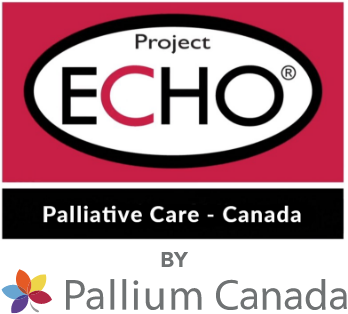About the Palliative Care ECHO Project

The Palliative Care ECHO Project is a 5-year national initiative to cultivate communities of practice and establish continuous professional development among health care providers across Canada who care for patients with life-limiting illness. Led by Pallium Canada and its Hub Partners from across Canada, this Project delivers a continuous learning journey for health care providers to build local capacity to provide a palliative care approach to patients and their families.
Building Palliative Care Capacity
The Palliative Care ECHO Project is designed to create virtual communities of learners in palliative care by bringing together local health care providers (and community leaders) with regional, provincial or territorial, and national subject matter experts for continuous learning, deep-dive discussions, national presentations, and interactive, case-based discussions. These knowledge exchange opportunities foster an “all learn, all teach” approach, where experts and learners rely on each other for continuous collaboration, problem-solving and professional growth.

The power of ECHO is in its connectivity
ECHO uses a “hub and spoke” education model to connect health care providers in communities (“spokes”) with teams of specialists and experts at regional and national centres (the “hub”).
The creation of hubs is the anchor of the overarching model and exists to be more responsive to local, regional and provincial, or sector-specific needs.
The spokes represent the various communities, such as family health teams and paramedics, and settings of care, such as long-term care residences and home care that are served by a hub. Health care professionals who work within these spokes are the beneficiaries of the various palliative care educational interventions created by the hub and by Pallium that will enhance their learning and practice.
Pallium’s role
Pallium Canada’s role is to coordinate and connect the system of hubs across Canada, curate and develop content to support Hub Partners (and their spokes) in meeting their local needs, deliver national palliative care programming, and lead the overall evaluation of the Project’s impacts and reporting.
Funding acknowledgement
The Palliative Care ECHO Project is supported by a financial contribution from Health Canada. The views expressed herein do not necessarily represent the views of Health Canada.

